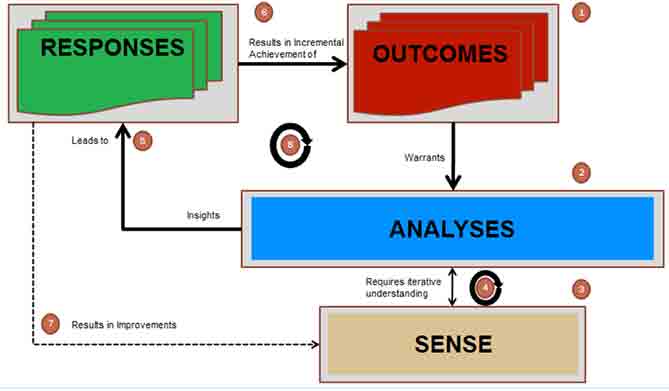By Ajay Bhargava
In the last 20 years, the exponential growth in data generated by people and objects has far outpaced the growth in talented resources that can derive value out of it. In an attempt to fill the gargantuan gap between supply and demand [1], many university graduate programs have sprung up (particularly in the last five years), offering a degree in analytics, but clearly that is not enough.
The massive current and forecasted demand for analytical resources has caused many students, young professionals and others to look at analytics (and big data) as a career, and this movement is seen across industries. But a big stumbling block question in a lot of their minds is, “How do I know if analytics is the right ‘cup of tea’ for me?” or “How do I transition to a career in Analytics leveraging my background and experiences?” This article describes a cost-effective, analytical approach to try and iteratively answer the question. To be clear, this is one of many potential ways to approach the problem.
To begin with, I will describe the analytical approach as shown in Figure 1. We will then see how we can apply this approach, along with the 5W1H way (who, what, where, when, why and how) of information gathering, to see how we can effectively “taste” before we “eat” from the “analytics career” buffet.

Figure 1: An analytical approach to a career choice in analytics.
The analytical approach, as I define it, is an “outcomes-driven” process of “analyzing” the environment, accomplished by iteratively “sensing” and understanding the processes and data. The insights from the analyses results in actionable “responses,” which are then measured to see if they made a positive difference in achieving the defined outcomes. As part of embracing an analytics-driven culture, this analytical cycle, as shown in Figure 1, is repeated as a continuous improvement process, to incrementally achieve the desired goals and objectives. In other words, this approach is an outcomes-driven analytical approach that is: iterative, cyclical, repeatable, results-focused, measureable and based on analyses. Further, it results in: actionable insights (responses), incremental achievement (outcomes) defining of new outcomes and continuous learning and improvement in data and process (sense).
So, let’s apply this approach to deciding “if analytics is the right career choice for me.”

Figure 2 shows examples of things we might consider.
Outcomes: Outcomes, in general, can be:
- a desired result
- achievement of a desired goal and associated objectives, within constraints
- an answer to a question/hypothesis/query
- solution to a problem, within constraints
- quantifiable impact, e.g., to the bottom line, the top line, brand, customer service, etc.
- a qualitative improvement, e.g., increase in X, decrease in Y
- can result from prior analyses and actions
For our purposes, we want to answer the question, “Is analytics the right career choice for me?” Note that we likely won’t be able to answer this question with one cyclical iteration of this approach.
In addition to answering the question, we may decide to put a time constraint (say six months), adopt a philosophy of “taste before eating,” i.e., we may not want to do a master’s/Ph.D. in analytics only to find out that it’s really not my “cup of tea.” Often, the focus in this part of the approach is on “what” and “when” (to make it a realistic exercise). It is assumed that the beneficiary (i.e., “who” is “you”) is quite clear on the “why” behind deciding to explore a career in analytics or is in the process of getting clearer.
Analyses: In this stage, the focus is more on the “what.” In order to try and answer our question, we may realize that we need to have:
- a multi-pronged strategy that may require learning, networking, industry research, etc.
- hands-on experience on a specific problem in a given industry, e.g., healthcare, insurance, retail, banking, etc.
- type of analytics, e.g., descriptive, predictive, prescriptive [2]
- kind of analytics, e.g., data or text
- industry-agnostic areas/lines of business analytics, such as social analytics, customer/marketing analytics, HR analytics, fraud analytics, call center analytics, etc.
- a learning plan (role-based curriculum; statistical and data mining algorithms)
- research analytical roles in industry
- meet/work with various relevant people in industry and academia
Sense: A good way to start is to understand the different types of roles played by analytics professionals in different industries [3]. Researching how analytics and big data can benefit different industries [1, 2, 3, 4] would be a good exercise to narrow down some industries you might be interested in. Exploring the landscape of open data sources available freely on the Internet [5] gives a flavor of issues faced by lines of businesses in an industry. In addition, many local, state and federal agencies in the United States (and globally) put out data sets that are useful for doing some “exploratory data analysis.”
These data sets are often analyzed to determine certain hypotheses/questions that could be answered by analytics. In addition to data, understanding the business processes (e.g., process of converting a prospect to a customer for a life insurer) along with the “data dumplings” from the workflow of the process is critical and very handy when trying to model the problem.
Responses: Here, we focus on “how” to instantiate the “what” from analyses. In order to learn concepts and fundamentals, one could take some cost-effective options such as registering for massive open online courses (MOOCs), webinars and free training materials by various product vendors. Later, one could enhance their knowledge and test it by studying for and taking the INFORMS CAP® certification test [6]. In order to do some analyses, I suggest learning R (statistical programming language), SQL (database language) and Python/JavaScript (scripting language) to begin with.
Having picked up the concepts, languages, certification, etc., here are some “get your hands dirty” type of things to do:
- Choose some publicly available data sets [5] from a preferred industry (if you have one), and do some exploratory data analysis to formulate questions or hypotheses that could be answered by any type or kind of analytics listed above. This is an actionable, results-oriented, hands-on way of proceeding through a full model development lifecycle (MDLC) and learning analytics.
- Obtain a meaningful, hands-on internship using sites such as linkedin.com, indeed.com, etc.
- Another good way to get your “hands dirty” would be to sign up for free exercises to solve some real-world problems with the help of a mentor [7].
- Having gained some practice in applying the concepts, one could then participate in some competitions [8, 9] and hackathons.
- Attend as many “Meetup” sessions in your city to listen to other people providing value via analytics. It is a great way to build your network of practitioners in the industry.
After executing on these “how to meet what” things, measure to see if you have met your objectives. At this stage, you may decide that you need to explore more and go deeper. Hence, you may decide to choose a master’s degree in business analytics, or you might come up with more questions. In order to decide which university, research and come up with a scorecard to compare and contrast various graduate programs across multiple dimensions. These could include cost, duration, hands-on experiences in practicum and capstone projects, companies visiting to hire on campus, data vs. text analytics, etc. This scorecard then becomes “data” for the next cycle of analytical approach.
In summary, the approach described in this article does two things: 1) It provides an economical and analytical way to start the exploratory journey of figuring out whether a career in analytics (or really, for that matter, any field) is the right thing for you; and 2) It is a good way to keep asking more questions and to make incremental decisions throughout the journey.
Analytics is an exciting career choice for me. It not only provides an envelope to deliver value to my clients (and helps pay my bills in the process), but it also equips me to tell the story the data is trying to convey [10] in a business language. Similarly, repeatedly applying this outcomes-driven approach to your own questions and objectives will immerse you in an “analytics-driven” culture, thus helping you in many facets of your own life, not to mention deciding that first (or next) step in your career journey.
REFERENCES
- “Big data: The next frontier for innovation, competition and productivity” (full report),http://www.mckinsey.com/insights/business_technology/big_data_the_next_frontier_for_innovation
- “Descriptive, Predictive and Prescriptive Analytics,” http://www-01.ibm.com/common/ssi/cgi-bin/ssialias?infotype=SA&subtype=WH&htmlfid=TIW14162USEN#loaded
- “Analytical Disciplines compared to Data Science,”http://www.datasciencecentral.com/profiles/blogs/17-analytic-disciplines-compared
- “Insurance and Big Data,”http://www.ciosummits.com/media/solution_spotlight/A_dozen_ways_insurers_can_leverage_big_data_to_extract_value.pdf
- Publicly available data sets, http://www.kdnuggets.com/datasets/index.html
- Certified Analytics Professional program, https://www.informs.org/Certification-Continuing-Ed/Analytics-Certification
- “Web Analytics Demystified,” http://www.webanalyticsdemystified.com
- Kaggle, http://www.kaggle.com/
- Analytics competitions, http://www.kdnuggets.com/competitions/index.html
- “Data Visualization,” https://icrunchdatanews.com/data-journalist-david-mccandless-data-visualization-ted-talk/
Bio: Ajay Bhargava (ajaybhargava@analyticsadvisorygroup.com) is a management consultant and strategist based in the Austin, Texas, area. He has more than 25 years of IT consulting, product development, research, business development, industry speaking and teaching experience in areas relating to databases, enterprise data management, data architecture, data warehousing, business intelligence, data and text analytics, statistics, data mining and big data. From 2010-2014, while with Tata Consultancy Services, he built the Global Analytics & Big Data practice for TCS Insurance & Healthcare customers. During that same timeframe, he was a lecturer at the University of Texas at Austin where he taught courses on “Elements of Data Analytics” and “Supply Chain Optimization.” He holds a master’s degree in computer science and aerospace engineering from the University of Texas at Arlington.





 雷达卡
雷达卡
















 提升卡
提升卡 置顶卡
置顶卡 沉默卡
沉默卡 变色卡
变色卡 抢沙发
抢沙发 千斤顶
千斤顶 显身卡
显身卡





 京公网安备 11010802022788号
京公网安备 11010802022788号







